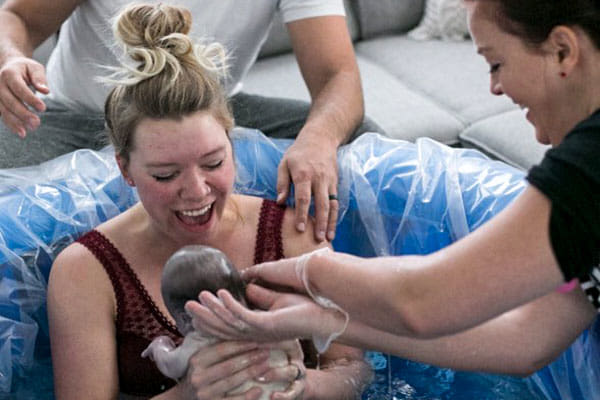The midwives at My Expert Midwife have had a lot of experience caring for women who birth at home, as well as women who birth in hospital. The current research supports homebirth as a safe choice for both you and your baby, if you remain free from any other complications during your pregnancy. If you do have other complications this does not mean you cannot have a homebirth, but it may be that you would be advised to birth in hospital. Discuss any additional risk factors you may have with your midwife or doctor, but the decision on where you birth is ultimately your choice.
Why does labour work better at home?
Giving birth at home in your own comfortable environment is often a much more relaxing and easier experience. The reason for this is quite simple, your body and your mind work together much more effectively when you feel safest and usually you feel that your “safe space” is at home. The spontaneous onset of labour is driven by hormones, oxytocin being the key hormone, and the more effective you are at producing oxytocin the more likely you are to produce regular contractions, which will help you to have a quicker and easier labour. Other hormones affect oxytocin production though, if you start to feel scared or uncomfortable in a different environment, adrenalin is produced and this dulls the effect of oxytocin, often slowing down regular contractions. The effects of this can be clearly seen in maternity care, when a woman is contracting regularly at home and decides it’s time to go to hospital to have her baby. On arrival or during the journey contractions can often slow down due to the change in environment and the production of adrenaline.
Research behind homebirth
Currently, in the UK, just over 2% of women give birth at home, however, this increases to 10% in some areas where more time has been invested in developing and promoting homebirth services.
Women consistently report greater satisfaction rates when giving birth at home than they do when having their baby in a hospital, stating that they feel more empowered and in control.
Planning to have your baby at home also reduces your chances of having a caesarean section or needing an assisted delivery (using forceps or ventouse). Research links successful breastfeeding with homebirth too, with mothers more than twice as likely to be exclusively breastfeeding their babies at six months of age.
Who can I have at my homebirth?
During your labour and birth, you will have two midwives to support you, who are trained to deal with recognising if your labour is progressing well or if you may need transferring to hospital for closer monitoring. Your midwives will also bring all the equipment you need, as well as organising the gas and air if you want it. You can also have as many friends or family members as you would like to visit you during your labour and after you have had your baby.
If you feel as though homebirth is an option you and would like to explore it in more detail, you can ask your midwife for more information or search for a local homebirth support group- there is usually one in most areas of the UK. Attending a homebirth support group will give you more information and an opportunity to talk to other parents about their experiences.
Often women and families want to know what they might need if they plan a homebirth, below is a list of things which may be helpful.
A list of things that are useful for a homebirth
- A birth bag which you can fill with all the essentials things you and your baby will need in the hours after birth, such as a change of clothes, baby clothes and nappies, toiletries, maternity pads and pants etc. If you need to go into hospital for any reason during your labour or after the birth, this bag will be already packed for you to take.
- Plenty of snacks and a selection of drinks for yourself and birth partners. Tea and biscuits are often appreciated by midwives too!
- A portable birthing pool- these can be bought, hired or loaned, sometimes for free from community midwives or schemes in your local area.
- Absorbent pads, which are similar to incontinence sheets. These are great for using when getting in and out of the bath/pool to absorb water or after the birth to contain any blood loss.
- Plenty of towels. They certainly don’t need to be new ones, just freshly cleaned, dried and warmed to put over you and your baby after the birth.
- A couple of cheap shower curtains. You can often find these in discount stores or pound shops. They are useful to help protect any furnishings or carpets.
- Prepare an area in your home that you feel you might want to nest, labour and birth in by arranging things you will find comforting and helpful. These may include pillows, cushions, fairy lights and birth affirmations.
Summary
In summary, although most women go into hospital to have their babies, lots of research suggests it is safe and that there are positive benefits for women to have their babies at home. You can do further homebirth research yourself if this blog has interested you and contact your local homebirth support group to hear real life stories about what it is like to have your baby at home.



















